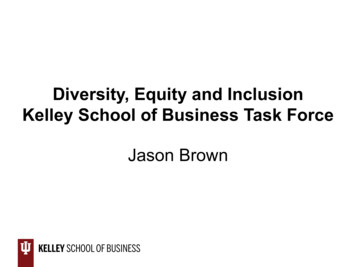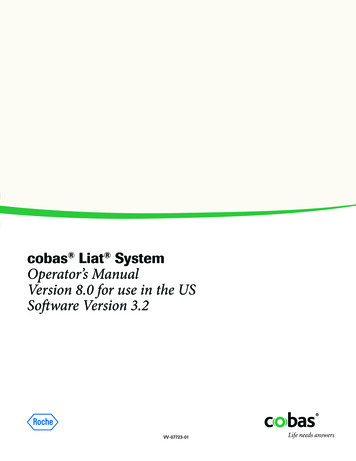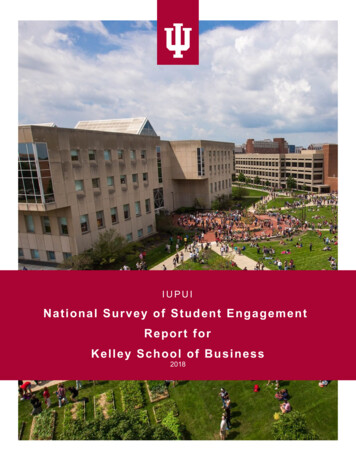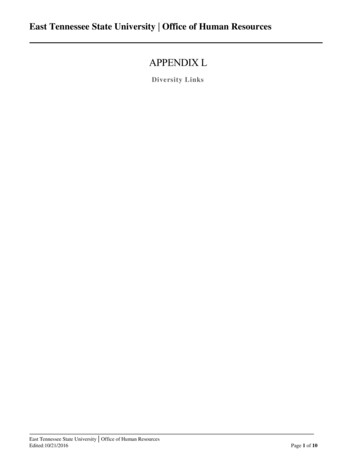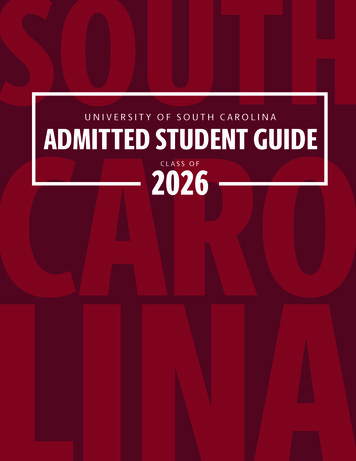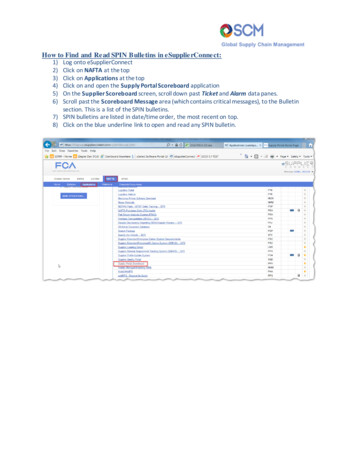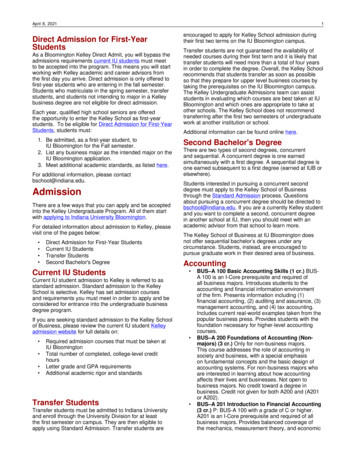
Transcription
April 8, 2021Direct Admission for First-YearStudentsAs a Bloomington Kelley Direct Admit, you will bypass theadmissions requirements current IU students must meetto be accepted into the program. This means you will startworking with Kelley academic and career advisors fromthe first day you arrive. Direct admission is only offered tofirst-year students who are entering in the fall semester.Students who matriculate in the spring semester, transferstudents, and students not intending to major in a Kelleybusiness degree are not eligible for direct admission.Each year, qualified high school seniors are offeredthe opportunity to enter the Kelley School as first-yearstudents. To be eligible for Direct Admission for First-YearStudents, students must:1. Be admitted, as a first-year student, toIU Bloomington for the Fall semester.2. List any business major as the intended major on theIU Bloomington application.3. Meet additional academic standards, as listed here.For additional information, please contactbschool@indiana.edu.AdmissionThere are a few ways that you can apply and be acceptedinto the Kelley Undergraduate Program. All of them startwith applying to Indiana University Bloomington.For detailed information about admission to Kelley, pleasevisit one of the pages below: Direct Admission for First-Year StudentsCurrent IU StudentsTransfer StudentsSecond Bachelor's DegreeCurrent IU Students1encouraged to apply for Kelley School admission duringtheir first two terms on the IU Bloomington campus.Transfer students are not guaranteed the availability ofneeded courses during their first term and it is likely thattransfer students will need more than a total of four yearsin order to complete the degree. Overall, the Kelley Schoolrecommends that students transfer as soon as possibleso that they prepare for upper level business courses bytaking the prerequisites on the IU Bloomington campus.The Kelley Undergraduate Admissions team can assiststudents in evaluating which courses are best taken at IUBloomington and which ones are appropriate to take atother schools. The Kelley School does not recommendtransferring after the first two semesters of undergraduatework at another institution or school.Additional information can be found online here.Second Bachelor's DegreeThere are two types of second degrees, concurrentand sequential. A concurrent degree is one earnedsimultaneously with a first degree. A sequential degree isone earned subsequent to a first degree (earned at IUB orelsewhere).Students interested in pursuing a concurrent seconddegree must apply to the Kelley School of Businessthrough the Standard Admission process. Questionsabout pursuing a concurrent degree should be directed tobschool@indiana.edu. If you are a currently Kelley studentand you want to complete a second, concurrent degreein another school at IU, then you should meet with anacademic advisor from that school to learn more.The Kelley School of Business at IU Bloomington doesnot offer sequential bachelor’s degrees under anycircumstance. Students, instead, are encouraged topursue graduate work in their desired area of business.Accounting Current IU student admission to Kelley is referred to asstandard admission. Standard admission to the KelleySchool is selective. Kelley has set admission coursesand requirements you must meet in order to apply and beconsidered for entrance into the undergraduate businessdegree program.If you are seeking standard admission to the Kelley Schoolof Business, please review the current IU student Kelleyadmission website for full details on: Required admission courses that must be taken atIU BloomingtonTotal number of completed, college-level credithoursLetter grade and GPA requirementsAdditional academic rigor and standardsTransfer StudentsTransfer students must be admitted to Indiana Universityand enroll through the University Division for at leastthe first semester on campus. They are then eligible toapply using Standard Admission. Transfer students are BUS–A 100 Basic Accounting Skills (1 cr.) BUSA 100 is an I-Core prerequisite and required ofall business majors. Introduces students to theaccounting and financial information environmentof the firm. Presents information including (1)financial accounting, (2) auditing and assurance, (3)management accounting, and (4) tax accounting.Includes current real-world examples taken from thepopular business press. Provides students with thefoundation necessary for higher-level accountingcourses.BUS–A 200 Foundations of Accounting (Nonmajors) (3 cr.) Only for non-business majors.This course addresses the role of accounting insociety and business, with a special emphasison fundamental concepts and the basic design ofaccounting systems. For non-business majors whoare interested in learning about how accountingaffects their lives and businesses. Not open tobusiness majors. No credit toward a degree inbusiness. Credit not given for both A200 and (A201or A202).BUS–A 201 Introduction to Financial Accounting(3 cr.) P: BUS-A 100 with a grade of C or higher.A201 is an I-Core prerequisite and required of allbusiness majors. Provides balanced coverage ofthe mechanics, measurement theory, and economic
2April 8, 2021 context of financial accounting. Strikes a balancebetween a preparer's and a user's orientation,emphasizing that students must understand bothhow transactions lead to financial statements(preparer's orientation) and how one can infertransactions given a set of financial statements(user's orientation). Relies on current, real-worldexamples taken from the popular business press.First part of the course introduces students tothe financial accounting environment, financialstatements, the accounting cycle, and the theoreticalframework of accounting measurement. Secondpart of the course covers the elements of financialstatements, emphasizing mechanics, measurementtheory, and the economic environment. Credit notgiven for both A201 and (A205 or A200).BUS–A 202 Introduction to ManagerialAccounting (3 cr.) P: BUS-A 100 with a gradeof C or higher. A202 is an I-Core prerequisiteand required of all business majors. Conceptsand issues associated with the accounting andmanagement of business; particular emphasis isgiven to understanding the role of accounting inproduct costing, strategic decisions, costing forquality, cost-justifying investment decisions, andperformance evaluation and control of humanbehavior. Credit not given for both A202 and (A207or A200).BUS–A 205 Honors Introduction to FinancialAccounting (3 cr.) P: BUS-A 100 with a grade ofC or higher, and students must be admitted to theHutton Honors College or the Business HonorsProgram. A205 substitutes for A201, an I-Coreprerequisite that is required of all business majors.Concepts and issues associated with corporatefinancial reporting; particular emphasis is placedon understanding the role of financial accountingin the economy, how different accounting methodsaffect financial statements, and developing a basisfor lifelong learning. Credit not given for both A205and (A201 or A200).BUS–A 207 Honors Introduction to ManagerialAccounting (3 cr.) P: BUS-A 100 with a gradeof C or higher, and students must be admittedto the Hutton Honors College or the BusinessHonors Program. A207 substitutes for A202, an ICore prerequisite that is required of all businessmajors. This course is about developing and usingmeasurement systems to support firms' internaldecision making. The course shows students howaccounting information fits into the dynamics ofmanaging a complex entity and provides studentswith a conceptual framework for using managerialaccounting practices to solve economic problems.Credit not given for both A207 and (A202 or A200).BUS-A 271 Global Business Analysis –Accounting (1.5 cr.) P: BUS-D 270 with agrade of C or higher. Provides students with anunderstanding of the major dimensions of globalaccounting, the factors affecting preparers andusers of global accounting, and the relative impactof various dimensions on countries, companies, andstakeholders.BUS-A 272- Global Business Immersion –Accounting (3 cr.) P: BUS-D 270 with a grade of Cor higher, additional department consent required.The Global Business Immersion course includesinternational travel. It extends the knowledgegained in Global Business Environment, D270and concentrates directly on the management ofmultinational firms. Sample Topics: Global Reporting in Switzerland: Providesstudents with an understanding of the majordimensions of global accounting, the factorsaffecting preparers and users of globalaccounting, and the relative impact of variousdimensions on countries, companies, andstakeholders. Includes an overseas trip toGeneva, Switzerland to visit businesses,governmental, and non-profit organizationalto learn first-hand the impact of globalaccounting.Romania: Managing in Mature Markets:Students look at how managers shouldmeasure performance in the Romanianeconomy that has shifted from Soviet-styleeconomics to the current European Union.BUS–A 303 Communication for Accountants(1 cr.) P: BUS-C 204 or BUS-C 205 with a gradeof C or higher; and declaration of the Accountingmajor. Required for all Accounting majors.Students are introduced to effective written andoral communication skills, specifically for use inan accounting career. The course approach is toview accounting-related interactions (accountinginterviews with clients, preparing audit reports, andso on) from a communication perspective. Studentsmay not receive credit for both A303 and BUS(C301 or X301). This course is taught by the CPCSdepartment.BUS–A 310 Management Decisions and FinancialReporting (3 cr.) P: BUS-A 201 or BUS-A 205and BUS-A 202 or BUS-A 207, each course witha grade of C or higher. Accounting majors musttake A311 and A312 (not A310). Provides studentswith a thorough understanding of the theoreticalfoundations underlying financial reporting, therules used by accountants to measure the effectsof business decisions and to report the effects toexternal parties, the use of judgment in financialreporting, and the transformation of cash flowdecisions into accrual-based and cash-basedfinancial statements. Students are expected todevelop technical, analytical, and interpretive skillsrelated to economic transactions and accrual-basedfinancial statements. Credit not given for both A310and (A311 or A312).BUS–A 311 Intermediate Accounting (3 cr.) P:BUS-A 201 or BUS-A 205 and BUS-A 202 or BUSA 207, each course with a grade of C or higher.Provides students with a thorough understandingof the theoretical foundations and mechanicsunderlying financial reporting. This rigorous course issuitable for students seeking a career in accountingor finance. The course's primary objective is togive students the tools necessary to understandand execute appropriate accounting procedures,with an appreciation of the broader context inwhich accounting information is produced andutilized. A311 provides an overview of the financial
April 8, 2021 statements and then focuses in more detail onrevenue recognition, current assets, long-termassets, and accounting for investments. Credit notgiven for both A311 and A310.BUS–A 312 Intermediate Accounting II (3 cr.) P:BUS-A 311 with a grade of C or higher. Providesstudents with a thorough understanding ofaccounting for long-term liabilities and debtinvestment, stockholders' equity, and preparationof cash flow statements. Course's first objective isto give students the tools necessary to understandand execute appropriate accounting procedures.Course's second objective is to help studentsunderstand the process through which accountingstandards are determined and to evaluate theoutcomes of that process from the perspectivesof managers, shareholders, auditors, and others.Students will learn to assess competing accountingtheories and methods from multiple perspectives.Credit not given for both A312 and A310.BUS–A 324 Cost Management (1.5 cr.) P: BUS-A201 or BUS-A 205 and BUS-A 202 or BUS-A 207,each course with a grade of C or higher. Accountingmajors must take A325 (not A324). Product costingand strategic cost management. Covers severalaccounting systems and techniques that ascribecosts to products, services, and other activities, andthe costing systems' potential effects on businessdecisions in light of a firm's strategic, technological,and environmental position. Particular emphasisis placed on interpretation of the numbers andanalyses generated by various accounting systems.Credit not given for both A324 and A325.BUS–A 325 Cost Accounting (3 cr.) P: BUS-A201 or BUS-A 205 and BUS-A 202 or BUS-A 207,each course with a grade of C or higher. Enablesthe student to prepare, use, and critically evaluatemanagement accounting information for purposesof strategic decision making, planning and control,product costing, and performance measurementand evaluation. Particular emphasis is placedon interpretation of the numbers and analysesgenerated by various accounting systems in orderto make effective managerial decisions. Credit notgiven for both A325 and A324.BUS–A 327 Tax Analysis (1.5 cr.) P: BUS-A201 or BUS-A 205 and BUS-A 202 or BUS-A207, each course with a grade of C or higher.Accounting majors must take A329 (not A327).Provides a business framework for tax planningand decision making. Applications include selectionof savings vehicles for individuals, comparison ofbusiness entities, compensation tax planning, andinternational tax planning. Credit not given for bothA327 and A329.BUS–A 329 Taxes and Decision Making (3 cr.) P:BUS-A 201 or BUS-A 205 and BUS-A 202 or BUSA 207, each course with a grade of C or higher.Provides a business framework for tax planning anddecision making based on discounted, after-tax cashflows. Technical tax topics are covered within thecontext of the framework. Credit not given for bothA329 and A327.BUS–A 337 Accounting Information Systems(3 cr.) P: BUS-P 370 or BUS-P 304 with a gradeof C or higher. The core of every organization's3 Information Systems, are accounting applicationswhich record, control, report, and augment decisionmaking. Both the future Accountant or BusinessTechnologist needs to understand the importanceand interconnected nature of this software. Thiscourse introduces or expands understanding ofERP software as it applies to Modern AccountingInformation systems at an Enterprise level. Topicsinclude: the SDLC, databases, fraud, internalcontrols (COSO and COBIT frameworks), analytics,reporting, and software project management.Students typically gain hands-on experience withleading ERP accounting software such as: SAPR/3, NetSuite, or Microsoft Dynamics. Students willdraw from lecture, texts, case studies, and teamprojects. Course content is updated frequently tocover emerging topics and current events in thisdynamic field. Taught concurrently with BUS-S 400;Accounting majors should enroll in A337 to meetstate CPA educational requirements. Credit notgiven for both A337 and S400.BUS–A 422 Advanced Financial Accounting I(3 cr.) P: BUS-A 310 or BUS-A 312 with a gradeof C or higher. Generally accepted accountingprinciples as applied to partnership accounting,business combinations, financial reporting forcombined entities, foreign-currency and hedgingissues, derivatives, segment reporting and goodwillallocation/impairment. Particular emphasis is givento consolidated financial statements.BUS–A 424 Auditing & Assurance Services(3 cr.) P: BUS-A 312 with a grade of C or higher.Objectives of course are to provide students withan understanding of: (1) the auditing environmentand professional ethics; (2) audit reports and theconditions under which alternatives are used; (3)basic auditing concepts; (4) audit evidence anddocumentation; (5) analytical reviews; (6) the auditrisk model; (7) review and documentation of internalcontrols; (8) audits of cycles; (9) statistical sampling;and (10) audit objectives and audit procedures formechanized systems. Emphasis is on the conceptualdevelopment of the subject matter, the nature ofprofessional practice, and the technology of auditing.BUS–A 437 Advanced Management Accounting(3 cr.) P: BUS-A 325 with a grade of C or higher.Objective of course is to provide students withadvanced managerial accounting knowledge andskills. Emphasis is on strategic decision making andmanagement control systems. Students will providecase analyses and presentations.BUS–A 440 Applied Professional and EmpiricalResearch in Accounting and Auditing (3 cr.) P:BUS-A 312 with a grade of C or higher. Studentswill identify accounting and auditing researchissues; access and use authoritative literature,professional databases and support software;develop supportable conclusions and communicatethe results of their research in a professionalmanner. Students will also learn about empiricalsocial-scientific research methods as applied toaccounting and auditing topics.BUS–A 455 Topics in Accounting (1-3cr.) Variable topic, variable credit course inAccounting.
4April 8, 2021 BUS–A 490 Independent Study in Accounting (1–3 cr.) P: Consent of department chairperson and ofinstructor. Supervised individual study and researchin student's special field of interest. Student willpropose the investigation desired and, in conjunctionwith the instructor, develop the scope of work to becompleted. Comprehensive written report required. Business Economics and PublicPolicy BUS–G 100 Business in the Information Age (3cr.) This course is designed to provide studentswith an introductory survey of business practices,public policy, and economic information. Major topicsinclude understanding the U.S. economic system,wealth creation, business structures, businessethics, entrepreneurship, key business disciplines,the role of government and the current economicenvironment both domestic and global.BUS–G 202 Business, Government and Society(2 cr.) P: ECON-E 201 or ECON-S 201 with a gradeof C or higher. G202 is an I-Core prerequisite that isrequired of all business majors. It is also part of thesophomore Global Foundations Core. This course isintended to make students aware of the broad rangeof ways in which the non-market environment—especially government policy—affects business, andgain an understanding of the process through whichbusinesses and other special interest groups createand change the rules of the game under which theyfunction. In today’s economy, successful businessstrategy entails more than outmaneuvering rivalcompanies; managers must also devise strategiesto cope with the global, non-market forces thatconfront businesses and other forms of organization.Managers need to understand how public policy ismade and how special interest groups, includingtheir own businesses, can affect the policy process.This is true both for the CEO of a multinationalcorporation dealing with multiple governments andthe administrator for a local partnership trying to dealwith city officials.BUS-G 271 Global Business Analysis (1.5 cr.,8 wks) P: BUS-D 270 with a grade of C or higher.Students apply the country analysis skills, learnedin BUS-D 270 Global Business Foundations, to aspecific country or region. Many Kelley departmentsoffer versions of this course. This means that, whileall versions focus on business analysis, each couldemphasize a different field of business and/or regionof the world.BUS-G 272 Global Business Immersion (3 cr.,8 wks plus travel) P: BUS-D 270 with a gradeof C or higher, additional department consentrequired. The Global Business Immersion courseincludes international travel. It extends theknowledge gained in Global Business Environment,D270 and concentrates directly on the managementof multinational firms. Sample Topics: European Economic Integration from theItalian Perspective: Explore the economicintegration process in Europe and how theEuropean Union’s policies influence the Italianeconomy. Dynamic Economics in Korea: Over sixtyyears ago, the Korean economy consisted ofsmall farms. Now its companies are globalpowerhouses increasing their transactions withChina and Japan faster than with the U.S. Wewill examine how Korea achieved this throughpolicy and unique culture and how the countrymight balance its economic growth throughdomestic and foreign investment in the future.Luxury Brands in France: Explore thelegacy and unique brand positioning of Frenchmultinational luxury conglomerates in adynamic global market.BUS–G 300 Introduction to ManagerialEconomics and Strategy (3 cr.) P: ECON-E 201;only open to non-business majors. ManagerialEconomics is a course which illustrates howeconomic principles can be applied to makingeffective and profitable management decisions fora company. Within the course, students also learnhow to think strategically and apply the fundamentalsof game theory when they are making businessdecisions. The goal, then, of this course is to exposethe student to effective managerial decision-making.For a student interested in any management typeposition, this course will provide a fundamental basisfor further study. Managerial economics is also acourse that will serve the student throughout dailylife. Not open to business majors. No credit toward adegree in business. Students may not receive creditfor both G300 and G304.BUS–G 303 Game Theory for Business Strategy(3 cr.) P: BUS-G 202 with a grade of C or higher.Game theory, a traditional tool for academiceconomists, has become increasingly popular in thebusiness world and is an essential tool of economicconsultants. A major in Business Economics andPublic Policy must have more than a rudimentaryknowledge of Game Theory. Managerial decisionsare not static and cannot be made in isolation. Amanager must take into account and react to the“moves” of rival firms, government, and his or hersubordinates and superiors within the company.Game theory is designed for the study of thesetypes of interactions. The ultimate aim of the courseis to strengthen your ability to think strategicallyin business situations, rather than to teach youfacts or theories. To achieve this aim, we iteratebetween theory and practice. We use both formalcase studies and real world examples to sharpen ourstrategic thinking skills.BUS–G 304 Managerial Economics (3 cr.) P:BUS-G 202 with a grade of C or higher. Only forbusiness majors; non-majors should take G300.The main theme in the course is the application offormal analysis to managerial decisions in a varietyof settings. We begin by using optimization theoryto analyze the classical supply and demand modelof large markets, in which firms make productiondecisions based on a market price that they cannotaffect. Then, we move on to markets with fewerfirms, using game-theoretic tools to study managerialdecisions in an environment where those decisionsimpact the market as a whole. Lastly, weconsiderthe firm as a unit, focusing on more advanced pricing
April 8, 2021 strategies and contracting. This latter part of thecourse relies heavily on recent work in informationeconomics. Credit not given for both G300 andG304.BUS-G 316 Sustainable Enterprise (3 cr.) P:Sohpomore standing required. A sustainableenterprise is defined as any human endeavorwith integrity in three interrelated dimensions –environmental, cultural/social, and economic—and whose collective actions meet the needs ofthe enterprise and its stakeholders today withoutcompromising the ability of future generationsto meet their needs. The purpose of this courseis to investigate the challenges of implementingsustainability in a variety of contexts and under oftendivergent perspectives. This course is designed togive students the tools to be able to identify andexplain how sustainability creates new opportunitiesfor, and constraints on, enterprise value creation.Students will first focus on short term strategies(low-hanging fruit) that will then create momentumfor more long term organizational change forsustainability (game changers).BUS–G 345 Money, Banking, and CapitalMarkets (3 cr.) P: ECON-E 201 or ECON-S 201and ECON-E 202 or ECON-S 202, each coursecompleted with a grade of C or higher. This courseis designed to give students a broad introductionto the operation and structure of the U.S. financialsystem. It provides an analysis of the structure andfunctions of contemporary financial institutions andmarkets, together with an analysis of the prices thatare determined in these markets. Contemporarymacroeconomic and financial developments areemphasized and current phenomena and policyproposals and their implications are discussed.BUS–G 350 Business Econometrics (3 cr.) P:ECON-E 370 or STAT-S 301 or MATH-M 365,each course completed with a grade of C orhigher and an admitted Business student. Theobjective of the course is to understand variouseconometric, statistical, and forecasting tools formaking informed business decisions. Econometrictheories will be studied in order to understand theproper use of various methods in applied work.Computer exercises and applications to the realworld problems will be emphasized. Topics includelinear regression, binary dependent variable,simultaneous equations models, two-stage leastsquares, regressions with time series data and paneldata methods.BUS–G 400 Capstone in Economic Consulting(3 cr.) P: BUS-G 304. This capstone courseintends to develop or sharpen those skills thatare associated with a successful consultant. Agood economic consultant must be able to askthe right questions, possess a strong analyticalbackground, and be able to communicate findingsand recommendations effectively to his or her client.By analytical background, we mean: familiarity withsound economic thinking; ability to create or usefinancial, econometric, statistical, or other typesof modeling; effective command of spreadsheets,statistical software, and databases. In addition toall of the foregoing, a successful consultant mustdemonstrate a professional attitude, good judgment,5 the ability to work well both individually and as partof a team, and the ability to work under pressurewithout compromising on work quality. The studentwho takes this course is expected to be highlymotivated and have basic diagnostic, analytical, andcommunication skills. A capstone experience signalsa highly interactive structure between faculty andstudents.BUS–G 406 Business Enterprise and PublicPolicy (3 cr.) P: BUS-G 202 with a grade of C orhigher. This course is about areas of governmentregulation that affect business, including AntitrustLaws, Consumer Protection, Natural Monopoly, thePolitics of Regulation, and Pollution. A business'sability to deal with such regulations is oftenthe single most important determination of itsprofitability.BUS–G 456 Non-Market Risk Consulting (3 cr.) P:Sophomore standing required. Firms traditionallyfocus on outcomes: product quality, deliverytime, cost and pricing. Less attention has beengiven to process: environmental impacts, workerconditions and governance. With the reduction incommunication and coordination costs non-marketplayers such as activists, legislators and regulators,and society as a whole, have become more effectivein pressuring firms to focus on these process issues.Failure to do so leads to non-market risks: boycotts,negative information campaigns, legislation etc., thatdamages profitability. Non-market risk managementis aimed at spotting, mitigating, or eliminating theserisks. This course focuses on non-market riskconsulting strategies and how they may be alignedwith market strategies to drive log-run businessvalue.BUS-G 481 Business Analytics ConsultingWorkshop (1.5 cr.) P: Department consentrequired. C: BUS-K 481. Students enroll inBUS-BE 481. The objective of this course is toprepare students for careers in business analyticsconsulting. This course will provide students with: 1)understanding the players in the business analyticsconsulting industry; and 2) develop engagementrecommendation for a client by applying decisionmaking frameworks.BUS–G 490 Independent Study in BusinessEconomics and Public Policy (1-3 cr.) P:Department consent required. Supervised individualstudy and research in the student's special field ofinterest. The student proposes the investigationdesired and, in conjunction with the instructor,develops the scope of work to be completed. Writtenreport required. In conjunction with the EconomicConsulting major, a student may select to workwith an economic consulting firm in the summerfollowing the junior year. Upon returning to campus,the student then writes a detailed report on theinternship activities. An alternative is for the studentto work on an actual consulting job under theguidance of a faculty member.BUS–G 492 Predictive Analytics for BusinessStrategy (3 cr.) P: BUS-G 350. This coursedevelops the analytical tools and hands-onexperience with data and economic models tooptimally utilize information in decision-making.In addition, students will learn: presentation and
6April 8, 2021 communication skills for quantitative findings,targeted programming skills in VBA, and the basicsof identification for econometric models.BUS–G 494 Public Policy and the InternationalEconomy (3 cr.) P: BUS-F 370 or BUS-F 304 witha grade of C or higher. The goal of this class isto help students develop a sound understandingof the basic elements of international trade andfinance and the effects of various internationaleconomic policies on domestic and world welfare.Topics on international trade will include the potentialgains and losses from free trade agreements, theinclusion of labor standard in international tradeagreements, globalization and its consequenceson income distribution, and the global businesspractices within the bounds of anti-corruptionlaws. International agreements on regional tradeliberalization (such as EU and NAFTA) and onmultilateral trade liberalization (e.g., WTO) will behighlighted. Topics on international finance willinclude foreign investment, capital control, bal
standard admission. Standard admission to the Kelley School is selective. Kelley has set admission courses and requirements you must meet in order to apply and be considered for entrance into the undergraduate business degree program. If you are seeking standard admission to the Kelley School of Business, please review the current IU student Kelley

